Iranian Air Force F-14 Crashes Near Esfahan Due To Engine Fault

The Iranian air force said on Saturday that a US-built F-14 Tomcat warplane crashed and exploded in Esfahan due to technical fault in the engine but the two pilots survived.

The Iranian air force said on Saturday that a US-built F-14 Tomcat warplane crashed and exploded in Esfahan due to technical fault in the engine but the two pilots survived.
The army’s public relations manager for the central province of Esfahan told Tasnim news agency, affiliated with Iran’s Revolutionary Guard, that the pilot and co-pilot of the plane landed with parachutes thanks to ejection seats and were taken to hospital for treatment.
According to a survey by Flight Global in 2019, the Iranian air force operates around 24 F-14 Tomcats from a batch of 79 of the Grumman-made, swing-wing fighters that Iran purchased in the mid-1970s before the Islamic revolution. Some of them are still in service in Iran by improvisation in maintenance, since the US sanctions prevent purchase of new equipment and parts while the US Navy retired its last Tomcat in 2006.
This is the second aviation incident in Iran in less than a month. In May, an F-7 fighter jet of the Iranian Air Force crashed near the same city while on a training mission, killing both of the aircraft’s pilots.
Iran’s F-7 fighters are believed to have been modeled after China’s jet Chengdu J-7, whose third-generation export version is called F-7 and is considered a copy of the Soviet-era MiG-21.
Iran’s air force has an assortment of Russian and US-made military aircraft which are not considered to be in optimal condition as decades of Western sanctions have made it hard to maintain the aging fleet.
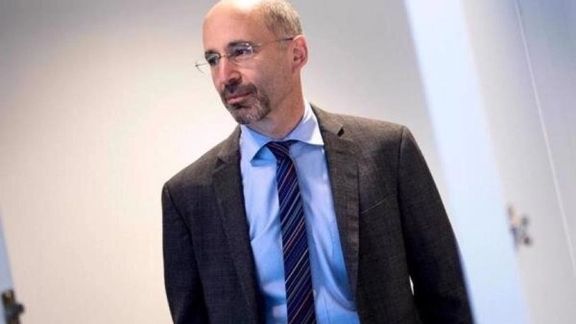
The US special envoy for Iran. Rob Malley, praised the efforts of UN experts to draw attention to the continuing crackdown on civil society and popular protests in Iran.
In a tweet on Friday, Malley applauded “the work of UN experts, including the Special Rapporteur for Human Rights in Iran, in calling attention to the continued crackdown against civil society in Iran.”
During the past few days, the United Nations Secretary General António Guterres as well as a group of UN human rights experts have expressed serious concerns about the violent clampdown by the Islamic Republic.
Guterres submitted an interim report to the Human Rights Council depicting the grim human rights situation in Iran on Thursday, a day after rights experts issued a statement urging those responsible for using excessive force to be held to account through comprehensive and independent investigations.
The UN chief urged the Iranian government to abolish the death penalty, release all persons detained arbitrarily immediately, and set up investigations into the use of excessive and lethal force during protests.
The UN human rights experts said, “We are alarmed at the recent escalation of allegedly arbitrary arrests of teachers, labor rights defenders and union leaders, lawyers, human rights defenders and other civil society actors.”
On Thursday, the US State Department also hailed the UN experts, and said their concerns are "certainly the concern of ours,” adding, “This is why we condemned the use of violence against these peaceful protesters. We made the point that we support the right of these protesters to peacefully exercise their fundamental freedoms."
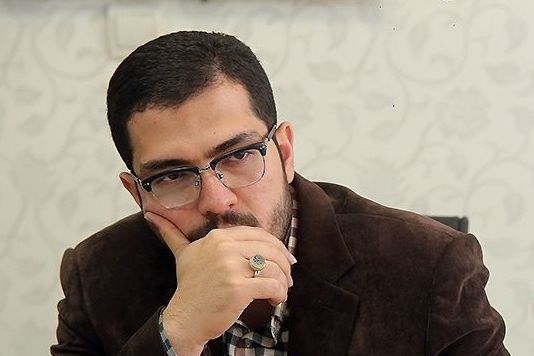
Speculations continue in Iran amid a news blackout over IRGC's arrest of admins running three of its own social media news channels on the Telegram app.
Iranians with some knowledge of the affair have reported that the counter-espionage unit of the IRGC arrested several journalists in Tehran, most notably Ali Gholhaki, a hardliner, conservative investigative journalists with a proven access to insider information from the Iranian establishment.
The arrest stirred a controversy on social media as various people with knowledge of personalities involved gave different accounts of Mr. Gholhaki’s background, performance and character. Iranian journalist Ali Maliki wrote in a tweet that Gholhaki’s arrest sounded odd as he was an example of journalists who are linked to Iran’s power centers.
Another Iranian journalist, Mojtaba Purmohsen quoted a post published on the hardliner Ammarioun channel on Telegram and wrote that the reason why Gholhaki was arrested was that he had disclosed Israeli infiltration into the IRGC Intelligence Organization.
Another netizen who introduced himself or herself as Emilia, wrote in a Twitter post: “If I were a spy I would have wanted to look like Ali Gholhaki and other hardliner journalists or even some of the Iranian lawmakers if I did not wish to be recognized easily.” Emilia was only one of the social media users who pointed out that spies usually chose to be disguised as hardliner Muslims.
An Iranian teacher, Siavash Khoshdel, tweeted: “Gholhaki has been arrested. But has he been detained legally? Even if yes, has there been a trial or a verdict? No. And there is no reason to believe that there would be a fair trial for him.”

In an interview with Iran International TV, analyst Mehdi Mahdavi-Azad quoted lawmaker Malik Shariati as having said that Gholhaki was arrested by the IRGC’s Counter Disinformation unit. “If this is true, one can say with a degree of certainty that Gholhaki was a member of The IRGC or Basij militia or he was in charge of a major IRGC project,” said Mahdavi Azad.
Mahdavi-Azad added that several Iranian journalists including Saba Azarpeik and Massoud Kazemi have said that Gholhaki was involved in fabricating incriminating evidence against them. The analyst argued that if this claim is true then Gholhaki was in one way or another cooperating with Iranian security-intelligence forces.
Mahdavi-Azad said that in the past Ali Ghazali the editor of Baztab news website and Mohammad Hossein Rostami the managing editor of ultra-conservative website Ammarioun had been arrested on similar charges, and they are still in jail. Similar arrests including that of investigative journalist Reza Golpour, said Mahdavi Azad, happened at a time when there was an internal conflict in the IRGC, and one part of the corps wanted to silence another part.
The analyst said that probably disclosures about parliament Speaker Mohammad Bagher Ghalibaf’s family luxury shopping trip, and the leaking of tapesincluding statements made by former IRGC commander Mohammad Ali Jafari as well as leaking another tape including remarks by Mehdi Taeb, the brother of IRGC Intelligence Chief Hossein Taeb could be reasons why Gholhaki was arrested. Interestingly, all of these controversies involved Ghalibaf.
Meanwhile, as Twitter user Anvari wrote in a warning to other conservative journalists and Twitter users: “Ali Gholhaki, a well-known conservative journalist has been arrested by the IRGC Intelligence on charges of espionage. Let it be known that the IRGC has no mercy even for you my dear friend.”
There is still no news about Gholhaki’s whereabouts or about the names of others who may have been arrested.
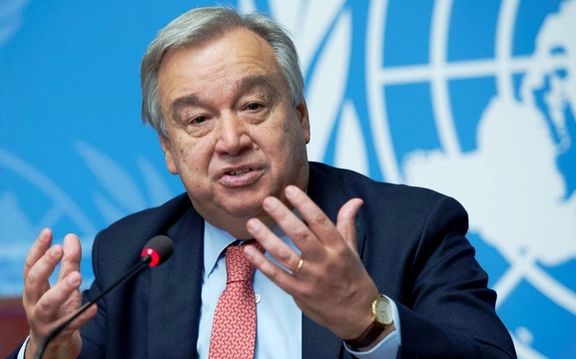
In its latest report on the situation of human rights in Iran, the United Nations has expressed concern over excessive force against dissidents and protests.
UN Secretary General António Guterres submitted an interim report on Iran’s rights situation on June 16 -- covering the period from June 11, 2021 to March 20 2022 -- to be presented to the Human Rights Council at its 50th regular session (13 June – 8 July 2022).
The report received testimonies and reports by non-governmental organizations, individuals, victims and their families “concerning potential violations of the right to life allegedly by the State, including arbitrary executions, use of deadly force by security forces against peaceful protesters and border couriers, as well as arbitrary deprivation of life in detention as a result of torture or denial of timely access to medical care.”
The Office of the United Nations High Commissioner for Human Rights continued to receive reports of torture and ill-treatment in places of detention, resulting in death, the UN chief said, mentioning the names of numerous people who died in custody such as Shahin Naseri, Amirhossein Hatami, Adel Kianpour and Baktash Abtin.
Decrying “the high number of death penalty sentences and executions” and “reports of death in prison due to denial of adequate and timely medical care,” the UN chief said that the number of executions in the Iran increased from at least 260 cases in 2020 to 310 individuals in 2021, and the number of continued to rise into 2022.
According to the report, between 1 January 2022 and 20 March 2022, at least 105 people were executed, and in March 2022, 52 prisoners convicted and sentenced to death on drug-related charges were transferred for execution to Shiraz Central Prison. By mid-March, at least 16 of them had been executed.
It also condemned Iran’s “execution of child offenders,” saying, “Under international human rights instruments, to which the Islamic Republic of Iran is a party, capital punishment shall not be imposed for offenses committed by persons below 18 years of age.”
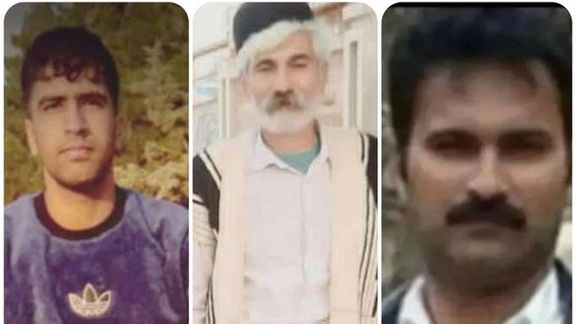
Referring to protests that broke out in over 26 cities in Khuzestan Province over water shortages in July 2021, the UN chief also criticized “enforced disappearances of protesters” and said that “on some occasions, the authorities reportedly used plainclothes agents to pose as armed or violent protesters, and subsequently blamed the deaths of protesters on them”
Guterres also expressed concern about the potential impacts of Iran’s policies aimed at increasing population growth, such as the Youthful Population and Protection of the Family law, which restricts sale of contraceptives, bans sterilization and restricts abortion, "on men, women and girls’ rights to sexual and reproductive health.”
The UN also voiced concern at “further legislative measures aimed at restricting the digital space,” including the User Protection Bill which “would grant the government and army extensive control over infrastructure that connects Iran to the global internet.”
The report also denounced the manner in which the Islamic Republic is using Article 49 of the Constitution to “confiscate wealth and property of minorities, particularly the Baha’i religious minority, as well as of political dissidents and their families.”
Guterres also noted that “journalists, including journalists abroad working for foreign media outlets, continued to be intimidated. Such acts included coercion by proxy through threats against family members inside the country, economic pressure, travel bans and interrogations.”
He also slammed the intensifying summoning, arrest and detention of labor rights defenders amidst growing protests by teachers, retirees and other groups demanding labor and social security rights.
Low growth, high inflation and widespread unemployment have caused widening economic disparities, the report added.
Guterres concluded his report with a list of recommendations to improve the human rights situation in the country, including abolishing the death penalty, reforms to strengthen the right to fair trial in line with international standards, releasing all persons detained arbitrarily immediately, investigations into the use of excessive and lethal force during protests and steps to eliminate all forms of discrimination against women and girls.
In March, Iran's foreign ministry accused the UN Human Rights rapporteur of 'politicizing' the situation of human rights in Iran and issuing biased reports, in reference to the report by UN special rapporteur Javaid Rehman.

“Banquet of Murderers” read the headline on Iran’s Fars news affiliated with the IRGC, reporting on an Al Arabiya interview with former US Secretary of State Mike Pompeo.
Although the report on Fridaywas not distorted and summarized Pompeo’s remarks in Persian, but the headline referred to his role in the targeted killing of Iranian military and intelligence strongman, Qasem Soleimani by the United States in 2020.
The headline was also a broadside at Saudi Arabia and its media, Al Arabiya, for the killing of Jamal Khashoggi in 2018 in Turkey. “Banquet of Murderers: Soleimani’s Killer Is Guest of Khashoggi’s Murderers,” said the full headline.
In the interview, Pompeo called the Iranian regime “evil theocrats” who aim to destroy the US and Israel. He also sharply criticized President Joe Biden’s policy toward the Islamic Republic.
“We know who the Iranian regime is. These are evil theocrats intent on the destruction of the nation of Israel and the United States of America. We ought not to be negotiating to figure out how much money to give them in exchange for an ephemeral promise for just a moment to slow down their enrichment and weapons program,” Pompeo told Al Arabiya.
The Trump administration withdrew from the Obama-era nuclear agreement with Iran, supported by Israel and Saudi Arabia, two countries along with the United Arab Emirates who have been concerned about Tehran’s nuclear and missile programs.
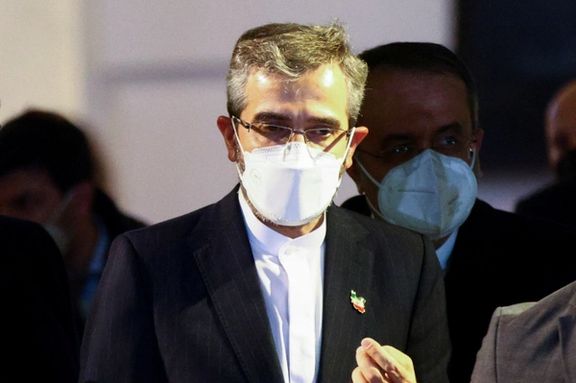
A series of strange tweets Thursday by Iran’s chief nuclear negotiator, Ali Bagheri-Kani, created confusion in Iran, with readers not knowing how to interpret them.
“We shan’t spend foreign policy treasures for the success of diplomacy; instead, we will sacrifice ourselves to achieve foreign policy objectives,” Bagheri-Kani tweeted in English, which was the translation of a Persian tweet same day.
This was the most confusing post, which led hundreds of Iranians to joke in reply. Some said about the original Persian text that they could not understand what the diplomat meant, and maybe it was “bad Google translation from Russian.”
One user went as far as to say that “surely Putin send you the text in Russian and the translation came out bad.”
Some thought Bagheri-Kani was sending cryptic messages about the stalled nuclear talks with the United States, not knowing to take them as a positive or negative sign.
Etemad Online website on Friday clarified that Bagheri-Kani apparently delivered a speech on Thursday and the tweets were quotes from his remarks, taken out of context and sounding vague and even poetic.
“The same Iran which managed to defeat the U.S. 'maximum pressure campaign', will not allow the Zionists to legitimize Iranophobia and anti-Iran campaign by spearheading the “maximum blackmail game,” was another tweet.
The main factor that surprized the public was Bagheri-Kani’s habit of not tweeting very often and then sending several messages in quick succession.